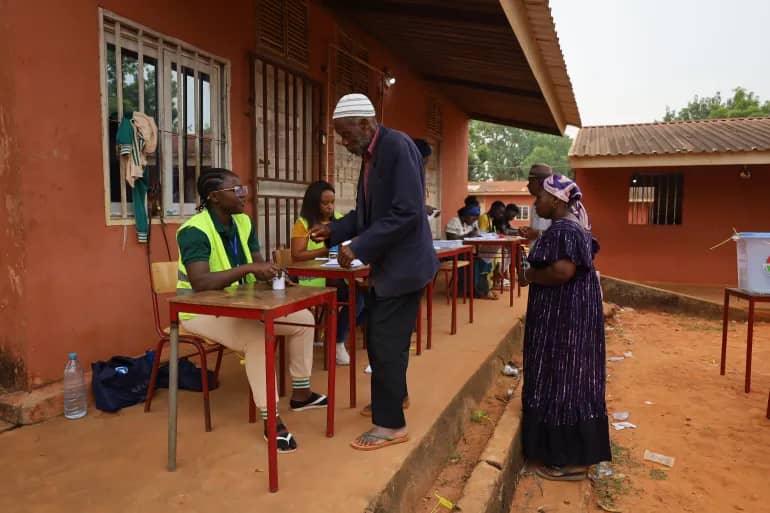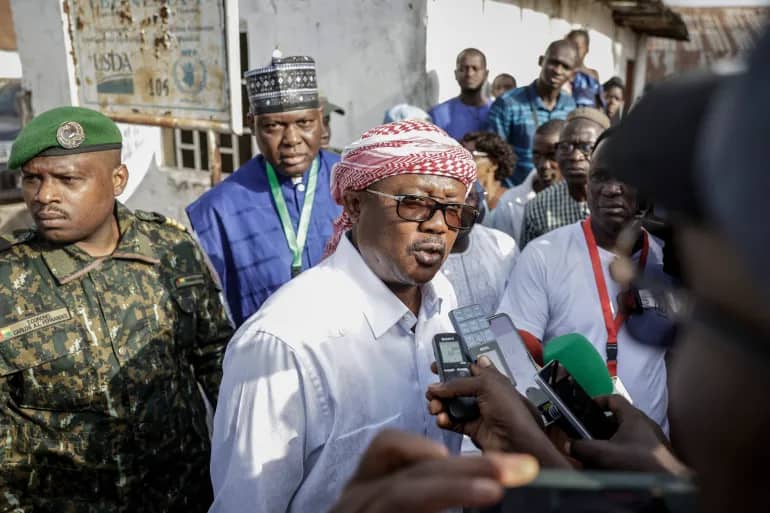Guinea-Bissau’s Ballot of Hope Plunges into Alledged Coup Drama as Rivals Trade Claims in Post Elections Scenario.
By Raymond Enoch
Guinea-Bissau’s high-stakes general elections, hailed by international observers as calm, orderly and largely credible, have tipped within days into one of the most dangerous political crises in the country’s modern history – a tense mêlée of rival victory claims, midnight manoeuvres around the military high command and now accusations of a “staged coup” at the very heart of power in Bissau.

On 23 November 2025, voters in the small West African nation trooped to the polls to elect both a president and a new legislature. Despite the exclusion of historic opposition heavyweight PAIGC from the presidential race, turnout was robust and enthusiasm palpable, as many citizens framed the ballot as a rare opportunity to reset a fragile democracy scarred by repeated coups and aborted transitions.
At the invitation of the National Election Commission, the Community of Portuguese-Speaking Countries (CPLP) deployed a 23-member Election Observation Mission (MOE-CPLP), led by Angolan retired Lieutenant-General Luís Diogo de Carvalho. In country from 18 to 27 November, the mission met the President of the Republic, key ministers, the election authority and several presidential contenders, and coordinated closely with other observer groups from ECOWAS, the African Union, the UN and the g7+.
On election day, ten CPLP teams fanned out across the Autonomous Sector of Bissau and the regions of Biombo, Cacheu, Oio, Bafatá and Gabú. They visited 221 polling stations in 22 constituencies, covering some 86,000 registered voters – roughly 9% of the electorate – and reported no obstruction to their work. Polling sites were properly identified and accessible, materials were available, ballot boxes were shown empty and sealed in public view, and both opening and closing procedures were respected, with only minor delays in a few locations.

Voting, the mission noted, unfolded in a calm and orderly atmosphere, with higher turnout in the morning, queues managed in an organised way and priority properly granted to those entitled to it. Voters presented their cards, were checked against the rolls and systematically marked with indelible ink. Most appeared familiar with the process, seeking clarification from polling staff when needed.
The CPLP observers highlighted the strong presence of youth and women in election administration – women accounting for about half of polling staff – and commended the professional, non-intrusive posture of security agents, who stayed near stations without interfering. Party and candidate delegates were present in all observed stations, followed the entire process from opening to counting and signed summary results posted in public view, reinforcing transparency.
In its preliminary statement on 25 November in Bissau, the mission congratulated the people of Guinea-Bissau for the peaceful and orderly way they exercised their right to vote, praised the performance of the National Election Commission and underscored the “fundamental importance” of respecting democratic principles and the rule of law. It urged all actors to resolve any disputes strictly within the legal framework and called for full respect of the will of the voters expressed at the polls.
But even as observers were validating the mechanics of the ballot, the political temperature in Bissau was rising fast.
Preliminary tallies circulating among party agents and diplomats began to suggest that opposition candidate Fernando Dias da Costa, of the API-CABAS GARANDI coalition and political heir of former president Kumba Yala, was running ahead and possibly heading for a first-round victory. At his campaign headquarters, supporters turned the evenings into a rolling vigil, singing and celebrating as more favourable figures were relayed from the interior.
In the camp of outgoing president Umaro Sissoco Embaló, seeking a new mandate after dissolving an opposition-dominated parliament in 2023 and staying in office beyond the formal end of his term, accounts spoke of an increasingly tense, nervous atmosphere. The incumbent, insiders suggested, was not ready to concede defeat to a rival whose campaign had surfed on promises of change and the backing – outside the ballot – of disqualified opposition heavyweight Domingos Simões Pereira.
Against this fraught backdrop, Embaló reportedly convened a series of sensitive meetings with senior officers of the Bissau-Guinean armed forces. Over 48 hours, he is said to have chaired a first session at General Staff headquarters, followed by a more restricted conclave at the presidential palace billed as a “confidential strategic redeployment” discussion. Around the table, according to sources, sat a tight circle: Chief of General Staff General Biaguê Na N’tam, special chief of staff Orta N’Ta and deputy chief of staff Mamadou N’Krumah. The substance of their exchanges has not been made public, but their timing – with opposition forces claiming the wind at their backs – fuelled unease in diplomatic circles.
Layered onto those nocturnal manoeuvres was the discreet presence in Bissau of Guinean General Sékouba Konaté, the former transitional leader of neighbouring Guinea and a man with deep networks in Sahelian security structures. His low-profile stay in the capital, overlapping with the palace consultations, added to speculation: was he there as a stabilising envoy under the colours of an international peace and development NGO, or as a behind-the-scenes broker in a delicate post-electoral power play?
On 25 and early 26 November, both main candidates escalated their rhetoric. Embaló’s camp publicly claimed a landslide win, talking of 65% of the vote and ruling out any second round. Fernando Dias’s supporters, in turn, insisted that their own tracking of results placed him clearly in front, warning against attempts to tamper with the count. The National Election Commission appealed for patience and urged contenders not to pre-empt its official announcement of provisional results, scheduled for 27 November.
Then, on 26 November, the fragile political equilibrium snapped.Sustained gunfire erupted around the headquarters of the National Election Commission in Bissau, with shots also reported near the interior ministry and the presidential palace. Journalists and residents described panic scenes as people fled the areas, a stark contrast to the calm queues of three days earlier.
Within hours, soldiers appeared on state television to announce that they had seized power. A spokesman for the armed forces declared that the military had taken “total control” of the country, suspended the electoral process, closed land, sea and air borders and established a “High Military Command for the Restoration of National Security and Public Order” to govern until further notice. All state institutions were said to be shut, with a night-time curfew imposed.
In this version of events, the army claims it acted after uncovering an alleged plot to manipulate electoral results involving national political actors, a well-known drug trafficker and foreign nationals – a framing that taps into Guinea-Bissau’s longstanding reputation as a regional narcotics hub and serial coup theatre.
Yet, even as masked soldiers were sealing off key buildings, President Embaló himself was on the phone to international media, notably Jeune Afrique, asserting that he had been arrested in the presidential palace around 1 p.m. by forces loyal to the army chief of staff – and presenting the unfolding events as a coup against him and the constitutional order. International outlets quickly relayed his account, while noting the lack of independent confirmation and the opacity surrounding who exactly was giving orders in Bissau.
Inside the country, a radically different narrative surged to the fore.
In a sharply worded statement published in Bissau on 26 November, the Front Populaire accused Umaro Sissoco Embaló, “driven by despair over the electoral results”, of orchestrating a staged coup d’État in collusion with General Biaguê Na N’tam, the Chief of General Staff. According to this account, militia groups linked to the presidency were used to attack the National Election Commission and simulate a putsch with a single objective: to prevent the publication of results scheduled for 27 November that would “confirm his unequivocal defeat”.
The press release alleges that Embaló’s plan is to illegitimately appoint a new President of the Republic and an interim Prime Minister for a short transition, then call fresh presidential elections in which he would again be a candidate. It points to what it calls a glaring contradiction: a head of state supposedly detained by the armed forces who nonetheless has the time and freedom to give multiple interviews to international media, personally announcing his “arrest” to the world.
The Front Populaire denounces what it terms a “criminal staging” aimed at usurping the sovereign will expressed at the polls. It condemns General Biaguê Na N’tam as complicit in a conspiracy against the Guinean people, holds both men responsible for the consequences of their acts and calls on “all forces of the nation” to rise up, firmly and peacefully, against what it labels the dictatorial and totalitarian drift of the outgoing president and his circle. It also accuses the international community of “complicit silence” in the face of repeated abuses against the population.
Between the army’s justification of a “necessary intervention” to save the state, Embaló’s portrayal of himself as victim of yet another coup attempt, and the opposition’s charge of a carefully choreographed self-coup designed to thwart an electoral defeat, Guinea-Bissau is once again trapped in competing narratives over who is defending – or subverting – democracy.
Opposition candidate Fernando Dias da Costa, 47, remains publicly convinced that the numbers are on his side. Political sources say he is determined not to relinquish what he believes is a popular mandate, even as the military seems to suspends the electoral process that was meant to formalise it.
Regional and international actors – from ECOWAS and the African Union to the CPLP and the UN – now face intense pressure to respond to yet another abrupt rupture in a country that has known at least nine coups or attempted coups since independence in 1974. Early calls from European capitals with strong historic and linguistic ties to Bissau have focused on restraint, denunciation of unconstitutional changes of power and demands for a rapid return to the interrupted electoral timetable.
Through the noise of gunfire, televised communiqués and duelling press releases, one constant remains visible: on 23 November, 2025 ordinary Bissau-Guineans queued in the heat, under the watchful gaze of domestic and international observers, to cast votes in a process that – at least procedurally – met key tests of transparency and order. The CPLP mission’s preliminary verdict is unambiguous in saluting that civic act and insisting that any disputes must be settled in courts, not in barracks or backrooms.
Whether that sober appeal from Lusophone partners, together with the still-mobilised presence of ECOWAS, regional elders and other observer missions, can help steer Guinea-Bissau away from the brink will determine far more than the fate of two rival candidates. It will tell a country that has repeatedly flirted with the gun whether, this time, its ballot can still matter.









